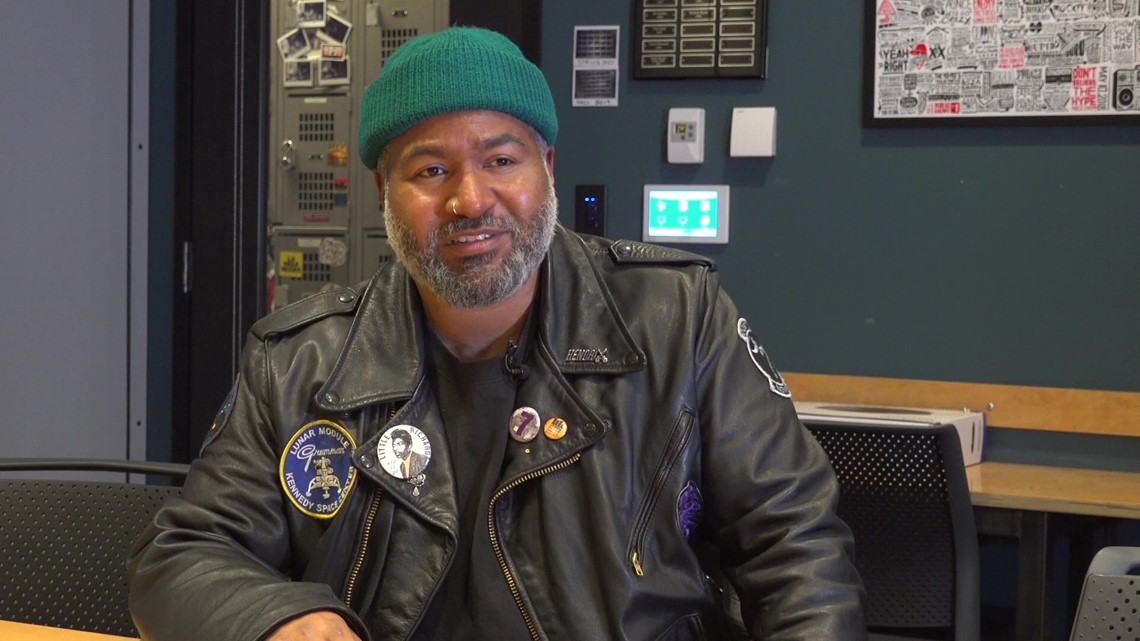SEATTLE — Before Larry Mizell Jr. was a host for KEXP, he was a listener.
"It feels like it's been around for as long as I've really been super musically curious," Mizell said. "It helped spur a lot of curiosity for me, discovering KCMU when I was like 15. It was hugely influential for me."
He remembers turning on the station in the 80s and 90s when now-KEXP was still KCMU.
"I remember Dan Savage had a show," Mizell said. "'Street Sounds', I believe, was 'Rap Attack.' There was so much great music at the time that was coming out."
KCMU helped Mizell understand the history behind the music, and he had the unique experience of going from being a listener to an artist played on the station and then a DJ sorting through music to find new gems to share.


"It's been a place where artists have gotten their first look. From all sorts of scrappy young bands that maybe did something, maybe they didn't, maybe they were Nirvana. They got their first play here," Mizell said. "I got my first play here. My group got its first play on KEXP in the early 2000s, and I think it's just been a huge resource for bands in the northwest specifically, but certainly around the world."
The station's live room sessions have been a big part of their success internationally and have earned them more than 2 million subscribers.
But KEXP's online success came after years of steady growth with roots dug in Seattle. The station began in 1972 when University of Washington students John Kean, Cliff Noonan, Victoria ("Tory") Fiedler and Brent Wilcox began what was then KCMU. You can read a timeline for the station here.
"KEXP's mission in the community has never changed. Although in 50 years a lot has stayed the same and a lot has changed, but our mission has always been to champion and celebrate music," host Cheryl Waters said. "We work every day to build community. Music makers, music lovers, we bring them together to do just that: champion and celebrate music. And that's been our mission from day one."
Waters marks 28 years with the station in April and said she is still as excited to discover new artists as she was when she began.
"I think the key is KEXP's amazing programming format. It's super wide, it's super deep. We're always looking for the best artists we can find," Waters said. "We never fall short of being excited to share that with our listeners and audience, and every single day I'm excited to discover something new and share it with a listener."
Waters said she loves playing something new next to something from 20 years ago, giving context to the music's influences and history. That sense of legacy runs throughout KEXP's work, including at their new home in Seattle Center.
"We've been in four locations in my 28-year history at the station. So many had so much heart and soul, and I loved every one of them," Waters said when asked about favorite milestones. "But in 2016, we opened the station up to the public and invited them in to experience music in a deeper way."
Waters said the new location allows touring artists to feel relaxed and valued and involves the audience with live sessions, a record store and a coffee shop.
That connection with the community is part of what still separates KEXP from other ways of finding music. Even as the amount of music and methods for listening to it grow, hosts handpick songs with care for artists and their listeners.
"The value of a community-based station like KEXP is immense," Mizell said. "As we have this kind of corporate conglomeration, you get homogenization and you get everything being 'same-ified.' It's the same thing that happens with digital streaming platforms, and everything's driven by an algorithm or, at the very least, a bottom line. Music discovery and humanity and things that you get from a station that is based in the community, that is reaching people in a real way, all that gets lost and thus it's extremely valuable that there's something like KEXP still around."

